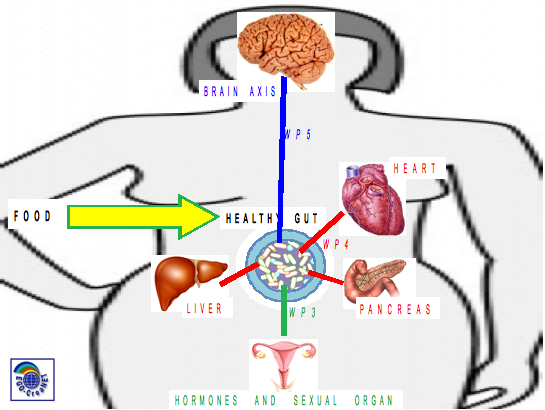Research into the Human Microbiome Lead to a Revolution in Human prevention of Health?
FUTURE HORIZON OF NUTRITION EUROPEAN PROJECT

The FUTURE HORIZON of NUTRITION project must be outlined as a modern nutritional prevention research that pursues the saying quoted by of Hippocrates.
“Let food be thy medicine and medicine be thy food”
The composition and activity of the gut microbiota co-develop in symbiosis with the Human host from birth changing at the different stages of life to ageing. The complex interactions depends on the host genome, high quality of nutrition, and active life-styles. The gut microbiota of the gastro intestinal tract (GI) is involved in the regulation of multiple host-metabolic pathways, giving rise to interactive host-microbiota metabolic, signaling to get a control of metabolic functioning of body and brain. The progressive lose of symbiotic inter-playing activities (Dysbiosis) produces auto-immune-inflammatory axes that physiologically connect the gut, liver, muscle, and brain. A deeper understanding of these axes for the prevention of dysbiosis is the main goal of the FUTURE HORIZON OF NUTRITION EUROPEAN PROJECT addressed to optimizing preventive therapeutic strategies to maintain an healthy gut microbiota metabolic symbiosis and to combat disease and improve Human Health.
FUHONU project will develop a multidisciplinary international Nutrition-research into the Human Microbiome leading to a prevention of the Human Health for going beyond the actual situation of Microbiome studies, developed until 2012.

The main purpose of the FUHONU project (FUTURE HORIZON OF NUTRITION) coordinated by the University of Florence and promoted by EGOCREANET x//CERA), is focused to understand how the nutritional factors affect the microbiome in relation to the prevention of metabolic diseases in the period of time that goes from birth to old age. In addition, the project aims to study the influence of changes in the primary metabolism of the microbiome on brain development and on the changes in human behavior that occur during the progression of elderly.
The gut microbiome functions works as a "primary metabolic organ" that characterize the individual functional and distinctive symbiotic activities. It has been amply demonstrated in numerous studies over the last ten years that a total of genes on the human microbiome act as an interface to epigenetic privileged relations that connect in a symbiotic activity our genes to the history of individual environmental exposures that grow up the microbiome. For instance, we know that two identical twins possess two different microbiome, this because their microbiomes was individually modulated by their dietary and psychology histories.
Therefore, the exploration of the relationship between diets and functionality of the microbiome, as primary metabolic organ, now offers (starting from the knowledge of the actual situation about the argument), the ability to provide new important insights for the overall health of the body and the mind. The Project European Cosortiun FUHONU, will be dedicated particularly to the dysbiosis as a cause of some neurological disorders.
The dysbiosis influence the functionality of the microbiome and impact on the whole neurotransmission and this interactivity affect the alteration of personality and behavioral and cognitive processes.
A better understanding of the nutritional prevention exerted by appropriate routes of xenobiotic metabolism (to ensure and maintain with the 'advancing from age' a HEALTHY GUT microbiome) has important implications for the FUHONU proposal, to improve the effectiveness of health by reducing the risk of physical and psychological diseases, resulting from malnutrition and finally aiming to promote a clear reduction of social expenditures of the welfare state.
The focus will be in the understanding the functionality of Symbiosis of MICROBIOME working in a cooperative coexistence with Human Life, seen in comparison to the effects of Dysbiosis that degenerate the healthy gut Microbiome. In this way the FUHONU project will develop a revolutionary approach seeing health as a microbial ecology evolution of biocenosis between Gastro intestinal bacteria and humans.
The Dysbiosis provokes changes in the bio-fermentation system of the GUT MICROBIOME and some of such metabolites coming from the change of the gut- fermentation can be seen as marker-sand signals of human health. Hence a Healthy Gut Microbiome can be seen on the basis of a grow up of microbe diversity, that can modulate the enzyme's reactor efficiency in order to change the risk factors of metabolic and immunologic diseases.
The emphasis, of the FUHONU project is to check the diets which aim should be to maintain a proper ecological balance in the gut -microbiome. This because when that balance is disrupted by dysbioses, such as through the use of a powerful, broad-spectrum of antibiotics, there can be serious consequences for a healthy gut microbiome and also for a degeneration of immunological protection.
Therefore the core of the FUHONU project will be the study of Diet- KITS to maintain or restore an Healthy gut Microbiome in pupils and adult persons (man and women) and to an active elderly. Those KITS of Food and Nutraceutical products will be studied and tested to improve a epidemiological - dietary demonstration trials.
The confrontation will be made between a healthy group of persons and other groups of obese people or other groups having for instance inflammatory bowel diseases.
An important section of FUHONU project will be dedicated at the theme: "Prevention of neurogeneration on the basis of the food-microbiota-gut-brain axis".
This sub-project look to optimize the relationship between diets and an healthy microbiome to prevent diseases in cognitive function during the different stage of life, as memory protection, depression, anxiety and other mental and behavioral health issues.
The sub-project will cover the following objectives: The basic strategy will be focused on qualify/quantify the gut brain axis relationships (operating both as neural and endocrine signals and messengers), looking for an active prevention of inflammation in the gut that affects the brain normal functioning. Viceversa the WP need also to focus also how decreased brain activity compromises healthy gut microbiome function.
The Deliverables of such sub-project "Prevention of neurogeneration on the basis of the food-microbiota-gut-brain axis" will be developed to analyze :
- how to recognize the signs and symptoms of gut-brain axis dysfunction
- how can be possible to develop dietary and life stiles modification to improve optimized Enteric (ENS) and -CNS brain interactive functions aiming to get an contribution to get a healthy gut-brain axis.
Finally, the FUHONU Project will enhanced a good evidence that the microbiome is dynamic and can be manipulated through diets to improve Human Health, and those results are going to be considered to improve next generation of higher quality of fortified foods and innovative nutraceutical or pre/probiotics products.
- In conclusion, the complex challenge of the project FUHONU is largely "cultural", because the FUHONU project needs to be addressed by large groups of multidisciplinary research that includes not only those studying the intestinal microbial ecology such as Gastroenterologists, but also Nutritionists, Neurologists, Biologists and Chemical researchers of metabolomics and genetics, .... those researchers together need to be able to share their approaches and experimental and cognitive research plans, into an extended and controlled epidemiological study that will be defined and planned by ISPO Tuscany Region. This complex INNOVATION of FUHONU international project, requires not only overcome the traditional disciplinary academic boundaries, but also to take into account how different diets related to the various food traditions and cultural (lifestyles) in Europe and in the world, can get a similar personalized healthy gut symbiosis. This endeavor of FUHONU project may be studied precisely because the personalized symbiosis between genoma and microbioma could play a major role in Human Health research and lead to a Revolution in Human Health's prevention for shaping the characteristics of personal health and individual behavior as a consequence of evolutionary factors that affect the individual history of the composition of the personalized microbiome.
Bibliography on line:
http://www.edscuola.eu/wordpress/?p=11931
https://www.facebook.com/groups/195771803846822/
http://www.genome.gov/27549400
http://mpkb.org/home/pathogenesis/microbiota
http://onlinelibrary.wiley.com/doi/10.1111/j.1753-4887.2012.00499.x/full
http://www.nature.com/nature/journal/v489/n7415/full/nature11552.html
Paolo Manzelli: nato a Terni il 25/06/1937, Chimico Fisico (Laurea: Firenze 1967), Studioso della Chimica del Cervello sulla base delle relazioni tra Energia, Materia ed Informazione. Direttore del Laboratorio di Ricerca Educativa del Dipartimento di Chimica della Università di Firenze.
Pmanzelli.lre@gmail.com
http://www.chim1.unifi.it/group/education/, e Presidente della Associazione Telematica EGOCREANET; http://www.egocreante.it;
www.edscuola.it/lre.html;
www.wbabin.net;
http;//www.descrittiva.it/CALIP/dna/DomandeRAI3.PDF;
http;//www.educationduepuntozero.it;
/Community/2009/11/27/hatigiannini.shtml;
http://www.genitoridemocratici.it/htm/creatprg.htm;
LRE@UNIFI.IT
dabpensiero.wordpress.com/;
www.globale.it
